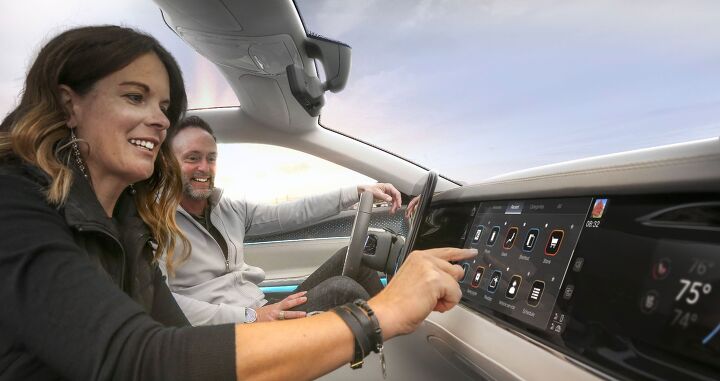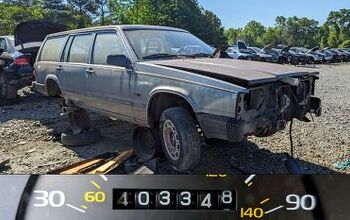Stellantis Developing 'Virtual Cockpit' With BlackBerry

Stellantis will be working with BlackBerry on a new virtual cockpit they believe will allow for faster development and lower production costs. The system, which is part of the company’s Virtual Engineering Workbench, is designed to replicate automotive controls using Amazon Web Services’ data cloud and is supposed to reduce development turnaround cycles by “up to 100 times.” The stated goal is to ensure new infotainment tech is created and then pushed to the public quickly and efficiently.
That’s according to the companies involved, anyway. The reality could be different and the complete tool doesn't appear to have manifested just yet.
However, it does sound like something that might address the software headaches associated with modern cars. When vehicles were more mechanical, bug prone ECUs weren’t really an issue. However, over-the-air updates and touchscreens have made today’s cars heavily reliant on the software installed. Stellantis and BlackBerry seem to think the virtual cockpit will streamline code tweaking and even feature development on all models by allowing engineers to replicate cockpits remotely.
From Stellantis:
Accessing QNX Hypervisor via AWS Marketplace enables Stellantis to include a virtual cockpit high-performance computing (HPC) simulation into a cloud environment. This industry-first platform for mixed-criticality and multi-OS embedded application development includes QNX Hypervisor Amazon Machine Images (AMIs) and industry-standard hardware interfaces as defined in the VirtIO standard Trout v1.2. With tools such as virtualization of graphics, audio, and touchscreen/mouse/keyboard inputs, the solution offers little to no difference between running QNX Hypervisor-based systems in the cloud versus on real hardware.
Software is a key building block for Stellantis to deliver clean, safe and affordable mobility, as outlined in the Dare Forward 2030 strategic plan, and the driving force behind the AI-powered STLA Brain, STLA SmartCockpit and STLA AutoDrive technology platforms. In 2022, Stellantis selected AWS as its preferred cloud provider for vehicle platforms and the companies began work on Stellantis’ purpose-built, in-house VEW.
Despite surveys indicating that most drivers don’t actually like the touchscreen trend and numerous studies suggesting that they’re actually less safe than earlier designs, the industry has stuck with them. Automakers know they allow additional opportunities for drivers to interact with the vehicle (useful for data harvesting, over-the-air updates, subscription services, and marketing programs) while also avoiding the need to source a bunch of buttons and knobs from various suppliers. They’re very obviously a double-edged sword. But one the industry seems committed toward retaining.
However, automakers have had trouble convincing drivers to appreciate proprietary user interfaces. There’s a reason car reviews go out of their way to mention that a vehicle is compatible with Apple CarPlay and Android Auto. Customers were already using their phones for most of the connectivity features offered on modern automobiles and often found them more intuitive than the vehicular UX offered by the manufacturer. Unfortunately, automakers want all the same data that’s being scooped by your cell provider, phone manufacturer, or preferred web browser and are tired of dealing with Big Tech middle men.
The response to this has been varied. General Motors opted to see if it could get away with dumping Apple CarPlay and Android Auto compatibility to see if they could force customers into its user interface. But that backfired horrendously, leading to loads of negative press. Meanwhile, other companies have tried to partner with massive tech companies to build something that would better overlap with preexisting smart devices. This is the route Stellantis appears to be pursuing, with BlackBerry and Amazon perhaps helping to shorten development times.
Stellantis believes it can generate 20 billion euros ($22 billion USD) in revenue from software and connected car services by 2030 and has marched out a “software strategy” to help the cause. Programs include the aforementioned STLA AutoDrive (developed in partnership with BMW), STLA Brain (a “service-oriented” vehicle software that uses data clouds), and STLA SmartCockpit (the new user interface developed with Foxconn). The virtual cockpit being developed with BlackBerry will work with all three, serving as a way for the company to develop and tweak all of the above.
“Software is becoming increasingly crucial in vehicles, leading us to innovate in how we develop and validate it,” stated Yves Bonnefont, Chief Software Officer at Stellantis. “With our virtual cockpit, we’re revolutionizing not just our approach, but also that of our suppliers and partners in the industry. Essentially, we’re able to get closer to our customer’s needs through this technology with faster development cycles, faster feedback loops, and quicker delivery of the technology they use and love. It’s a leap towards customer-first innovation and efficiency in the automotive world.”
Based on the general direction the industry has been heading in regard to service-based features and subscriptions, it’s doubtful that everything Stellantis plans on using the above tech for will actually be good for consumers. But the virtual cockpit at least sounds like the company will be able to get whatever it wants done faster, perhaps making vehicle fixes easier to address in the process.
[Image: Stellantis]
Become a TTAC insider. Get the latest news, features, TTAC takes, and everything else that gets to the truth about cars first by subscribing to our newsletter.

A staunch consumer advocate tracking industry trends and regulation. Before joining TTAC, Matt spent a decade working for marketing and research firms based in NYC. Clients included several of the world’s largest automakers, global tire brands, and aftermarket part suppliers. Dissatisfied with the corporate world and resentful of having to wear suits everyday, he pivoted to writing about cars. Since then, that man has become an ardent supporter of the right-to-repair movement, been interviewed on the auto industry by national radio broadcasts, driven more rental cars than anyone ever should, participated in amateur rallying events, and received the requisite minimum training as sanctioned by the SCCA. Handy with a wrench, Matt grew up surrounded by Detroit auto workers and managed to get a pizza delivery job before he was legally eligible. He later found himself driving box trucks through Manhattan, guaranteeing future sympathy for actual truckers. He continues to conduct research pertaining to the automotive sector as an independent contractor and has since moved back to his native Michigan, closer to where the cars are born. A contrarian, Matt claims to prefer understeer — stating that front and all-wheel drive vehicles cater best to his driving style.
More by Matt Posky
Latest Car Reviews
Read moreLatest Product Reviews
Read moreRecent Comments
- Theflyersfan With sedans, especially, I wonder how many of those sales are to rental fleets. With the exception of the Civic and Accord, there are still rows of sedans mixed in with the RAV4s at every airport rental lot. I doubt the breakdown in sales is publicly published, so who knows... GM isn't out of the sedan business - Cadillac exists and I can't believe I'm typing this but they are actually decent - and I think they are making a huge mistake, especially if there's an extended oil price hike (cough...Iran...cough) and people want smaller and hybrids. But if one is only tied to the quarterly shareholder reports and not trends and the big picture, bad decisions like this get made.
- Wjtinfwb Not proud of what Stellantis is rolling out?
- Wjtinfwb Absolutely. But not incredibly high-tech, AWD, mega performance sedans with amazing styling and outrageous price tags. GM needs a new Impala and LeSabre. 6 passenger, comfortable, conservative, dead nuts reliable and inexpensive enough for a family guy making 70k a year or less to be able to afford. Ford should bring back the Fusion, modernized, maybe a bit bigger and give us that Hybrid option again. An updated Taurus, harkening back to the Gen 1 and updated version that easily hold 6, offer a huge trunk, elevated handling and ride and modest power that offers great fuel economy. Like the GM have a version that a working mom can afford. The last decade car makers have focused on building cars that American's want, but eliminated what they need. When a Ford Escape of Chevy Blazer can be optioned up to 50k, you've lost the plot.
- Willie If both nations were actually free market economies I would be totally opposed. The US is closer to being one, but China does a lot to prop up the sectors they want to dominate allowing them to sell WAY below cost, functionally dumping their goods in our market to destroy competition. I have seen this in my area recently with shrimp farmed by Chinese comglomerates being sold super cheap to push local producers (who have to live at US prices and obey US laws) out of business.China also has VERY lax safety and environmental laws which reduce costs greatly. It isn't an equal playing field, they don't play fair.
- Willie ~300,000 Camrys and ~200,000 Accords say there is still a market. My wife has a Camry and we have no desire for a payment on something that has worse fuel economy.


































Comments
Join the conversation
@Posky
So on this general subject, Zerohedge just posted a relevant piece about needless car technology and its perils. Here's a snippet:
Mozilla examined 25 different vehicle brands, and every single one of them “failed to meet the nonprofit organization’s minimum privacy standards”…
Another big mistake. The amount of money put into these things doesn't create any ROI. Let Google and Apple deal with this.